 |
The panel: Sammie, Dr. Rachel,
Marvelyn Brown, Kwame,
Chris Sainsbury and Tiffany Evans. |
“We are dying, so listen up!” shouted Alesha Renee, host of Black Entertainment Television’s (BET) pop-culture show
The 5ive, to the approximately 450 students sitting in the gymnasium of Erasmus High School in Brooklyn. “Some of you guys are out there, getting wild and not using protection.” Her message, which she delivered on November 15, is hardly an exaggeration: Last year, AIDS was the No. 1 killer among African-American women ages 25−34. What’s more, blacks ages 13−24 account for more than half of all newly diagnosed young people in the United States. Looking over at the guests she’d brought to Erasmus, Renee told the kids, “These people are here to teach you something.”
The people she mentioned were not your typical, run-of-the-mill AIDS educators. Instead, the students were treated to words of wisdom from BET’s Rap-It-UpYouth Empowerment Tour—whose campaign with the Kaiser Family Foundation won the Community Service Campaign Emmy Award earlier this month.
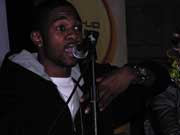 |
Sammie keeps it real with the crowd.
|
The Rap-It-Up panelists included hip-hop artists Soulja Boy, Styles P and Mike Jones; R&B singers Sammie, Tiffany Evans and Chrisette Michele; and relationship and sex expert
Dr. Rachel (
The Oprah Winfrey Show). Also present were 23-year-old HIV-positive AIDS activist Marvleyn Brown, actor Nicoye Banks (
Invincible) and celebrity trainer Chris Sainsbury. Rap-It-Up, a mobile grassroots HIV-prevention campaign consisting of college tours, public service announcements and network programming, came to the New York metropolitan area November 13–16. Along with
Hip Hop 4 Life, a New York-based organization dedicated to improving the lives of black and Latino youth through hip-hop and motivational programs, it sponsored two-hour forums at Erasmus, Harlem’s Bread and Roses High School, Newark’s East Side High School and the Bronx’s Community High School.
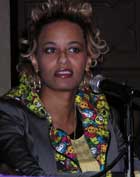 |
| Dr. Rachel offers safer sex advice. |
“We wanted to go to the areas that were hit the hardest with HIV, like the Flatbush area and central Brooklyn where rates are high,” said Sonja Lockett, the vice president of public affairs for BET. New York is home to more African Americans living with AIDS than any other U.S. city—yet this was Rap-It-Up’s first visit to the region. “We knew it was about time,” Lockett said. “By partnering with Hip Hop 4 Life, we got access to the high schools they’ve developed relationships with.”
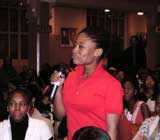 |
| A young woman makes a comment. |
The panelists discussed safer-sex techniques, debunked conspiracy theories and AIDS myths, and stressed the importance of getting tested. Those living with HIV shared their personal experiences and talked about stigma in the black community. Twenty-year-old singer Sammie told the crowd that his uncle died of complications from AIDS and that two of his aunts are living with the virus. “Because HIV has hit me close to home and the fact that I am young, I feel like youth can relate to me,” he said backstage. “God has blessed me with being able to do what I love, so why not give words of encouragement and be a positive influence?”
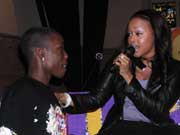 |
| Michele serenades a Erasmus student. |
Self-love—caring enough about yourself and your health not to rush into sex and, for people who do have sex, demanding that a partner always use condoms—was emphasized. Yet the Brooklyn forum addressed a significant irony: How can young people learn to respect themselves when misogynist lyrics and overtly sexualized images of women dominate some of the panelists’ own musical genre? Sammie promised his fans in the audience that he would not degrade women in his videos or songs. But he added that music is about catchy hooks—and that the kids shouldn’t feel like they have to imitate what they see on television.
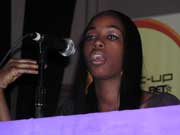 |
Brown shares her story of contracting HIV.
|
AIDS educators have long debated whether using hip-hop as an awareness tool merely reinforces the sorts of behaviors they’re trying to prevent. Yet what other avenue offers such access to communities of color, which mainstream prevention campaigns so often ignore? “To say that ‘hip-hop is this’ is a broad and [unfair] statement,” said panelist Kwame, a music producer whose younger brother died last year of complications from AIDS. “There are negative individuals and positive individuals in hip-hop culture. More positive people [like me] who embrace hip-hop need to come out and make our voices heard.”
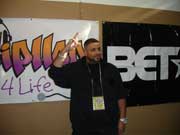 |
| DJ Khaled shows his support. |
Did the students hear him? “I learned that you have to love yourself first in order for others to love and respect you,” said 17-year-old Kalila Nelson from Brooklyn. “’Cause once you don’t have that, you will fall for anything.” Cesar Richardson, an 18-year-old senior, also chimed in. “I learned the importance of getting tested and that you don’t have to sex to fit in.
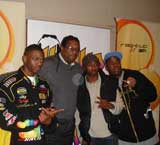 |
Bread and Roses’s principal Larry
Wilson, Soulja Boy, Sammie and
Mike Jones. |
The students were not the only ones impressed by the event. “I thought the program was fantastic,” said Dr. Leonard Kassan, Erasmus’s principal. To ensure that the forum’s impact would be felt throughout the school year, Hip Hop 4 Life has teamed up with Erasmus and other schools on the tour to develop ongoing programs. “This,” Kassan said, “is exactly what our school and students need.”
Pictures courtesy of Kellee Terrell and Hip Hop 4 Life.














7 Comments
7 Comments